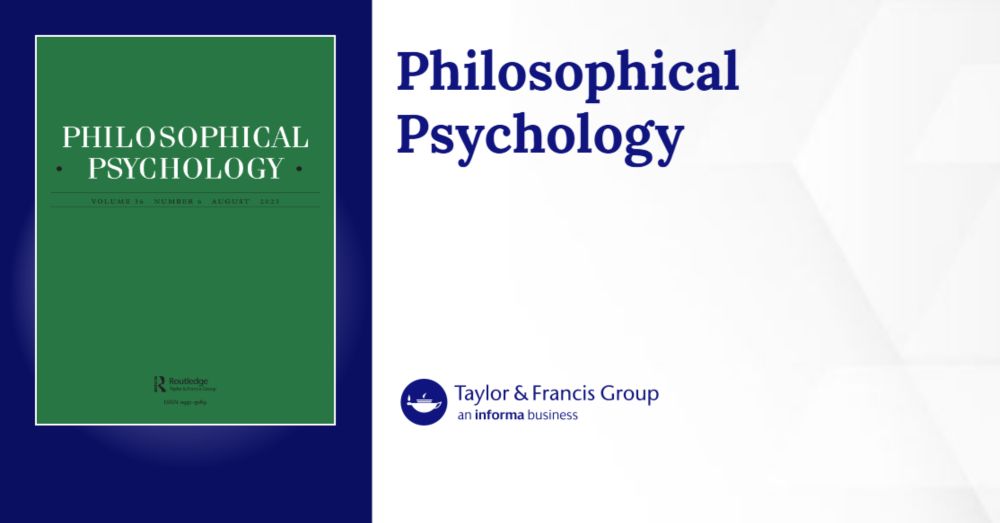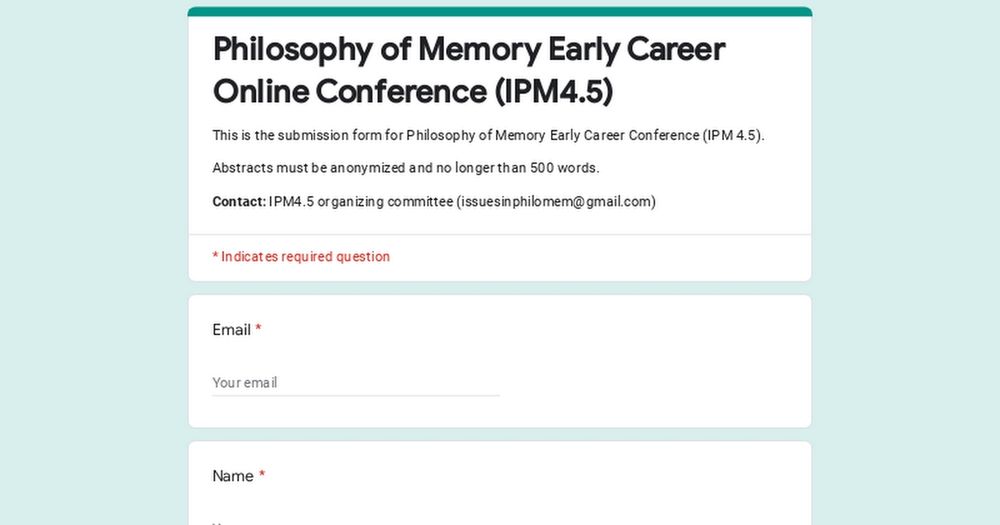IPM 4.5 starting now!
22.05.2025 07:11 — 👍 2 🔁 2 💬 0 📌 0
IPM 4.5 starts Thursday!
19.05.2025 08:04 — 👍 2 🔁 0 💬 0 📌 0
Don't forget IPM4.5 is coming up next week!
14.05.2025 05:02 — 👍 3 🔁 0 💬 0 📌 0

🚨Coming up soon on May 22–23: the Philosophy of Memory Early Career Online Conference (IPM 4.5)! Amazing lineup of speakers, with each early-career talk followed by commentary.
Program and connection details here: phomo.org/events/ipm4-5
09.05.2025 07:11 — 👍 3 🔁 1 💬 0 📌 3

Join us online on May 22–23 for the Philosophy of Memory Early Career Online Conference (IPM 4.5)
25.04.2025 12:59 — 👍 3 🔁 2 💬 0 📌 0

Michael Friedman, Suppes Professor of Philosophy of Science, Stanford University (1947-2025)
I regret to information the Bluesky philosophy community that Michael Friedman, noted philosopher of science and ground-breaking historian of Kant, neo-Kantianism, and logical positivism has died. May his memory be a blessing. #philsci
26.03.2025 01:24 — 👍 201 🔁 42 💬 7 📌 24
Thanks for the shout-out, Nir!
15.03.2025 16:26 — 👍 0 🔁 0 💬 0 📌 0
Deadline extended! Submit to #IPM4.5 by March 15th
25.02.2025 08:30 — 👍 0 🔁 0 💬 0 📌 0
Kinda like computational modeling 👀
18.02.2025 15:26 — 👍 1 🔁 0 💬 1 📌 0
More generally, we believe this kind of design shows that time is of the essence! Cool insights into the dynamics of cognitive control pop up when you bring participants back for multiple sessions. Huge thanks to my collaborators Rut Zaks‑Ohayon, Yossi Tzelgov, and the incredible Nir Fresco! (fin)
27.01.2025 11:49 — 👍 1 🔁 0 💬 0 📌 0

Surprisingly, the impact of task conflict didn’t increase with practice—performance gains were similar after the first session. We think task conflict is strongest when the conflict is novel. (5/n)
27.01.2025 11:49 — 👍 1 🔁 0 💬 1 📌 0

a cartoon character with a green hat says now that 's what i call a sticky situation
ALT: a cartoon character with a green hat says now that 's what i call a sticky situation
We found that repeating the task over consecutive sessions and across weeks improved response times in both congruent and incongruent trials, but the effect persisted. So, while you do get faster, overcoming interference from the sensory and semantic informational conflict doesn’t go away (4/n)
27.01.2025 11:49 — 👍 0 🔁 0 💬 1 📌 0
Beyond the informational conflict in Stroop stimuli, we manipulated task conflict by varying the proportion of word vs. non-word stimuli like ####. A higher proportion of non-word stimuli is thought to create greater task conflict, leading to higher expected interference with task stimuli (3/n)
27.01.2025 11:49 — 👍 0 🔁 0 💬 1 📌 0

an elderly woman stands in front of a whiteboard with the words a lot of conflict written on it
ALT: an elderly woman stands in front of a whiteboard with the words a lot of conflict written on it
The Stroop task is a classic tool to study cognitive flexibility. But how does repeated practice influence how we handle the conflict between sensory and semantic information encountered in the Stroop task? (2/n)
27.01.2025 11:49 — 👍 1 🔁 0 💬 1 📌 0
I think it goes something like laws, like sausages, cease to inspire respect the more we know how they are made
23.01.2025 21:24 — 👍 1 🔁 0 💬 1 📌 0
Is this a metaphor about sausages?
23.01.2025 19:27 — 👍 0 🔁 0 💬 1 📌 0
I think the motivation was (is?) that dynamical systems need not entail representational talk, unlike classical computation. Totally agree that they work well together though
21.01.2025 11:32 — 👍 1 🔁 0 💬 1 📌 0
Looks amazing, congrats! Looking forward to reading it soon
11.01.2025 20:37 — 👍 1 🔁 0 💬 1 📌 0
Memory, Emotion, and Forgiveness: Exploring the Connections
People wrong each other with remarkable frequency. Yet, they often manage to repair their relationships by forgiving each other. A prominent view in the moral ...
If your work explores the connections between memory, emotion and forgiveness, and if it does so from a philosophical and/or psychological perspective, please consider submitting a manuscript to this special issue: link.springer.com/collections/... #philosophy #psychology #emotion #forgiveness
20.12.2024 13:46 — 👍 48 🔁 19 💬 1 📌 0
We will feature this article in the January session of the International Memory Reading Group:
20.12.2024 11:44 — 👍 9 🔁 2 💬 1 📌 0
@jonathannajenson.bsky.social and I will discuss @thehessam.bsky.social's work in the next session of our International Memory Reading Group
02.12.2024 16:37 — 👍 7 🔁 3 💬 1 📌 0

Hessameddin Akhlaghpour outlines how RNA may implement universal computation
Could the brain’s computational abilities extend beyond neural networks to molecular mechanisms? Akhlaghpour describes how natural universal computation may have evolved via RNA mechanisms.
Could the brain’s computational abilities extend beyond neural networks to molecular mechanisms?
Listen to Paul Middlebrooks's latest "Brain Inspired" podcast, in which he talks with @thehessam.bsky.social about how universal computation may have evolved via RNA mechanisms: bit.ly/4eQ4Idc
26.11.2024 14:47 — 👍 34 🔁 10 💬 0 📌 3
The sense(s) of touch provides a boundary through which we can understand ourselves. How is this sense of bounded self retained in memory? Iva Apostolova is at The Memory Palace today, exploring the connections between memory and touch. Check it out!
#philsky #philscisky
26.11.2024 17:13 — 👍 16 🔁 3 💬 0 📌 1
PhD student in Philosophy of Mind at Ruhr University Bochum and part of the RTG Situated Cognition
Led by @suttonprofessor.bsky.social and Deputy Director Professor Paula Reavey, the Centre is a dynamic, collaborative, interdisciplinary research project advancing knowledge in relations between place and memory - placememory.net
into brain evolution & development, open science, art & science https://www.youtube.com/watch?v=6hMNZHsrNHw, music, making, javascript, contemporary dance https://www.youtube.com/watch?v=OZfHj7F2FzQ
website: katjaq.github.io
Legal Scholar @UHH
Law & Philosophy, Psychology, Neuroscience
Advocate for the human right to freedom of thought
Currently PI of research projects on legal & ethical issues of Neurotechnology, Psychedelics, & Virtual Reality
Account for digital note taking
Head of Molecular Psychiatry and Neurodegeneration Laboratory at Heinrich Heine University of Düsseldorf, Germany. Transmission and co-evolution mechanisms for brain function from the molecular to the individual/organismal level.
history of sociobiology/evolutionary biology/biology
history of behavioral/human/social science
Philosophy of Biology
University of Bordeaux | Milan
Professor passionate about student success & team science #firstgen #Brassica enthusiast walking Dogs of the Plant World
#Agriculture #Food #HigherEd #EduSky #Agsky #SciComm & more
#Soil #Crop #Science ; opinions mine
Director, Centre for the Sciences of Place & Memory, Stirling Uni, Scotland. Skill, memory, embodied cognition, philosophy, cognitive history, cricket, music, collaborating, wayfinding. Leverhulme International Prof: johnsutton.net & placememory.net
Assistant professor at the Haifa University, interested in how Humans smell, breathe, remember and recall their world.
Black lab dad. Writer and ambient musician. The Dynasty of the Divine coming soon!
www.adamrowan.info
Preorder my book: https://www.amazon.com/Dynasty-Divine-Adam-Rowan-ebook/dp/B0FS3G3WWH/ref
Our work focuses on advocacy, safety, and empowerment providing crisis support, safe spaces, and a voice for marginalized communities of LGBTIQA+ people. We believe in building a future where every LGBTQ+ person can live openly, safely, and with dignity.
Historian and Philosopher of Science. Ask me about my non-Bayesian theory of confirmation. 😬
philosophy of science • race, racialisation and racism in science • health inequities • epistemic diversity • epistemic and cognitive biases • processual ontology • methodological fairness
https://malinowska.web.amu.edu.pl
ISHPSSB Porto Meeting, 20-25 July, 2025 [Biennial Meeting of the International Society for the History, Philosophy, and Social Studies of Biology] https://ishpssb2025.icbas.up.pt/ #hpbio #philsci #histstm #histsci #philbio #hbio #sts
Do you really don’t know?
(I’m a philosopher and historian of biology, interested in all things evolutionary, #genetic, or #cognitive. I find most things ridiculous.)
http://www.ehudlamm.com
Philosopher at UNED. I write on the dark side of communication: lies, bullshit, fictions, fake news, disinformation, twitter.
Neuroscientist | PI of AudioPred at @UniOslo-RITMO.bsky.social
Studying predictive processing & developing intracranial EEG methods
Personal page: https://bit.ly/aBlenkmann
#cognition #iEEG #SEEG #perception #attention #neuroscience #predictiveprocessing
I post mainly about Neuroscience, Machine Learning, Complex Systems, or Stats papers.
Working on neural learning /w @auksz.bsky.social CCNB/BCCN/Free University Berlin.
I also play bass in a pop punk band:
https://linktr.ee/goodviewsbadnews











